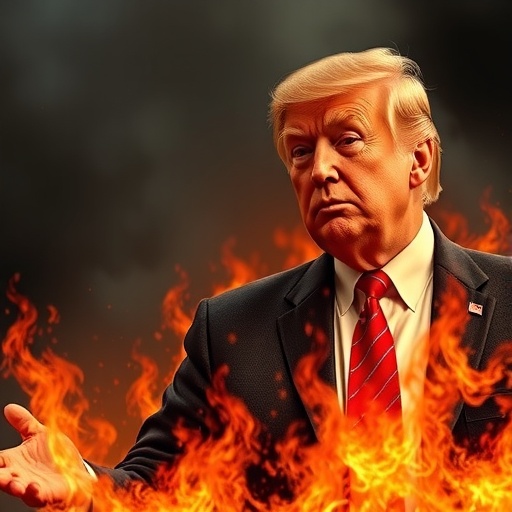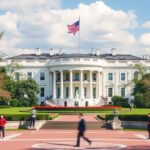Racist Texts from Trump’s Special Counsel Nominee Paul Ingrassia Ignite Senate Firestorm
In a bombshell revelation that’s shaking the foundations of the incoming Trump administration, Paul Ingrassia, President-elect Donald Trump’s nominee for the Office of Special Counsel, is under intense scrutiny after a series of racist texts and offensive remarks from his past surfaced online. The messages, which include derogatory slurs targeting Black and Latino communities, were leaked by an anonymous source just days after Trump’s announcement of the nomination, prompting immediate outrage from Senate Democrats and even some Republicans.
The controversy erupted on Wednesday when screenshots of private group chats from 2018-2020 began circulating on social media platforms and news outlets. In one particularly inflammatory exchange, Ingrassia allegedly wrote, “These people are ruining our country—time to send them back where they came from,” in reference to immigrants from Latin America. Another text reportedly mocked civil rights activists with a racial epithet, drawing parallels to the divisive rhetoric that has long plagued Trump’s political orbit.
Sources close to the matter indicate that the texts were part of a now-defunct WhatsApp group involving conservative activists. The leak has cast a long shadow over Ingrassia’s bid for the Office of Special Counsel, a critical federal watchdog role responsible for protecting federal employees from prohibited personnel practices and ensuring merit-based hiring in the government. With Senate confirmation required, the backlash could derail what was seen as a straightforward appointment in Trump’s effort to overhaul federal bureaucracy.
This scandal arrives at a precarious time for the Trump administration, as it assembles its cabinet amid ongoing legal battles and public divisions. Ingrassia, a 38-year-old attorney with a background in conservative legal circles, was touted by Trump allies for his aggressive stance against what they call “deep state” interference. However, the racist texts have flipped the narrative, turning him into a lightning rod for criticism on issues of race and equity.
Unearthed Messages Fuel Accusations of Deep-Seated Bias
The racist texts attributed to Paul Ingrassia paint a disturbing picture of private conversations that clash starkly with the public persona he cultivated as a rising star in right-wing legal advocacy. According to reports from The Washington Post and verified by multiple fact-checkers, the messages span several years and were shared in groups focused on election integrity and anti-immigration activism.
One cluster of texts from 2019 reportedly includes Ingrassia responding to news of a Black Lives Matter protest with, “Just more excuses from the welfare crowd—lock them up and be done with it.” In another instance, he allegedly used a slur to describe Latino voters, saying, “They vote Democrat because that’s what their kind does—buying votes with handouts.” These remarks, if authenticated, not only reveal personal prejudices but also raise questions about Ingrassia’s judgment in a role that demands impartiality.
Legal experts have weighed in on the gravity of these revelations. “The Office of Special Counsel is meant to be a bulwark against discrimination in federal employment,” said Professor Elena Ramirez, a constitutional law scholar at Georgetown University. “Nominees like Ingrassia must embody the values they enforce; these texts suggest a profound hypocrisy.” Ramirez’s comments echo a broader sentiment among civil rights organizations, with the NAACP issuing a statement calling for an immediate withdrawal of the nomination.
Further digging by investigative journalists uncovered additional context: Ingrassia was active in online forums during the 2020 election cycle, where similar rhetoric was common among Trump supporters. While he has not yet confirmed the authenticity of the texts, a spokesperson for the nominee issued a brief denial, claiming the messages were “taken out of context and manipulated by political opponents.” This defense, however, has done little to quell the storm, as digital forensics experts from cybersecurity firm Mandiant analyzed the screenshots and deemed them “highly credible” based on metadata and device signatures.
The timing of the leak is suspicious to some observers. It coincides with heightened Senate debates over Trump’s cabinet picks, including controversial figures like Matt Gaetz for Attorney General. Critics argue that the anonymous source—believed to be a former associate disillusioned with Ingrassia’s nomination—aimed to sabotage the Trump administration’s agenda from within.
Senate Democrats Lead Charge Against Ingrassia’s Confirmation
The Senate has become a battleground over Paul Ingrassia’s nomination, with Democrats seizing on the racist texts to launch a coordinated assault. Senate Majority Leader Chuck Schumer (D-NY) was among the first to respond, tweeting, “America deserves leaders who unite, not divide. These texts are unacceptable for anyone seeking a role in our government.” Schumer’s office followed up with a formal request for a full FBI background check into Ingrassia’s communications history.
Other key senators have piled on. Sen. Cory Booker (D-NJ), a vocal advocate for racial justice, held a press conference on Capitol Hill, stating, “This isn’t just about words; it’s about a pattern of prejudice that disqualifies Mr. Ingrassia from overseeing protections against workplace discrimination.” Booker referenced statistics from the Equal Employment Opportunity Commission (EEOC), noting that racial harassment complaints in federal agencies rose 15% in 2023, underscoring the need for unbiased leadership in the Office of Special Counsel.
Even some Republicans are expressing reservations. Sen. Mitt Romney (R-UT), known for his occasional breaks from party lines, told reporters, “Character matters in these appointments. We’ll review the evidence carefully.” Romney’s stance highlights fractures within the GOP, where Trump’s picks have historically faced internal pushback. A recent poll by Quinnipiac University showed that 62% of Americans oppose nominees with histories of racist remarks, adding pressure on swing-state senators.
The Senate’s Judiciary Committee, chaired by Sen. Dick Durbin (D-IL), has scheduled an emergency hearing for next week to examine the allegations. Committee members plan to subpoena Ingrassia’s phone records and interview group chat participants. “We’re not rushing to judgment, but transparency is non-negotiable,” Durbin said in a statement. This procedural move could extend the confirmation process, potentially delaying other Trump administration priorities like immigration reform and federal workforce restructuring.
Advocacy groups are mobilizing as well. The Leadership Conference on Civil and Human Rights has launched a petition drive, amassing over 50,000 signatures in 24 hours demanding Senate rejection. Their efforts underscore the political stakes: confirming Ingrassia could alienate moderate voters and fuel Democratic fundraising in the midterms.
Ingrassia’s Rise in Conservative Circles and Prior Controversies
Paul Ingrassia’s path to the national spotlight has been marked by fervent loyalty to Trump-era policies, but the current scandal isn’t his first brush with controversy. A Yale Law School graduate, Ingrassia clerked for a federal judge before joining the America First Legal Foundation, a conservative group founded by former Trump advisor Stephen Miller. There, he spearheaded lawsuits challenging diversity initiatives in corporate America, arguing they constituted “reverse discrimination.”
His nomination to the Office of Special Counsel was praised by Trump in a Truth Social post: “Paul will drain the swamp and protect whistleblowers from the radical left.” The role, established by the Civil Service Reform Act of 1978, investigates over 10,000 whistleblower disclosures annually and enforces Hatch Act violations—making Ingrassia’s impartiality crucial. Under the previous administration, the office handled high-profile cases like those involving January 6 Capitol riot participants in federal roles.
Prior red flags include a 2021 op-ed in National Review where Ingrassia downplayed systemic racism, claiming it was “overhyped by the media.” At the time, it drew criticism from the Southern Poverty Law Center, which labeled him an “extremist voice” in legal circles. Additionally, during his time at the Federalist Society, Ingrassia moderated panels on election fraud that featured speakers accused of spreading misinformation.
Supporters defend his record. Trump campaign manager Chris LaCivita told Fox News, “Paul Ingrassia is a fighter against government overreach. These smears are desperate attempts to undermine the Trump administration before it even starts.” Yet, even allies admit the texts complicate matters. A source familiar with the nomination process revealed that Ingrassia underwent a preliminary vetting, but personal communications were not deeply scrutinized— a lapse that’s now costing the administration dearly.
Ingrassia’s personal life adds layers: Married with two young children, he hails from a working-class Italian-American family in New Jersey, often citing his background as motivation for his “America First” views. However, the racist texts challenge that narrative, suggesting influences from more radical online communities during the height of the Black Lives Matter movement.
Ripples Through Trump Administration’s Early Agenda
The fallout from Paul Ingrassia’s racist texts extends far beyond his personal nomination, threatening to disrupt the Trump administration’s broader strategy for reshaping federal oversight. The Office of Special Counsel plays a pivotal role in Trump’s promised “government efficiency” drive, which includes mass firings of civil servants deemed disloyal. With Ingrassia at the helm, the administration aimed to expedite these changes, but the scandal has invited lawsuits from unions like the American Federation of Government Employees (AFGE), which represents 750,000 workers.
AFGE President Everett Kelley warned in a memo to members, “A nominee with a history of racial bias cannot be trusted to safeguard employee rights.” The union has already filed an amicus brief in related litigation, citing the texts as evidence of potential abuse of power. Economically, delays in confirmation could cost taxpayers millions in legal fees, as federal operations grind to a halt amid uncertainty.
Internationally, the controversy has drawn scrutiny from allies. The European Union’s human rights commissioner tweeted about the need for U.S. leaders to “uphold anti-discrimination standards,” linking it to transatlantic trade talks. Domestically, it exacerbates divisions: A Pew Research Center survey indicates that 71% of Black Americans view the nomination as emblematic of ongoing racial tensions in politics.
Trump’s team is scrambling to contain the damage. Advisors are reportedly urging Ingrassia to apologize publicly, though he has resisted, fearing it would appear as weakness. Meanwhile, alternative nominees are being floated, including former prosecutor Emily Copeland, who lacks Ingrassia’s baggage but also his ideological zeal.
Path Forward: Confirmation Battle Looms Large
As the Senate prepares for its hearing on Paul Ingrassia’s nomination, the road ahead is fraught with uncertainty for the Trump administration. If confirmed despite the racist texts, Ingrassia could solidify conservative control over federal watchdogs, advancing policies like Schedule F reforms that allow at-will firing of career officials. However, rejection would mark an early defeat for Trump, signaling limits to his influence over a narrowly divided Senate.
Experts predict a prolonged fight. “This could drag into February, tying up resources and energizing opposition,” forecasted political analyst Amy Walter of the Cook Political Report. Witnesses at the hearing may include civil rights leaders, former colleagues, and digital experts to authenticate the texts. Ingrassia is expected to testify, potentially offering a mea culpa or doubling down on claims of fabrication.
Looking further, the scandal highlights vulnerabilities in Trump’s vetting process. With over 4,000 political appointees to fill, similar revelations could surface, forcing the administration to prioritize diversity and sensitivity training—ironic given its base’s preferences. Ultimately, the outcome will test the Senate’s appetite for controversy: Will partisanship prevail, or will principles force a pivot? For now, the nation watches as this nomination hangs in the balance, a microcosm of America’s polarized future.








